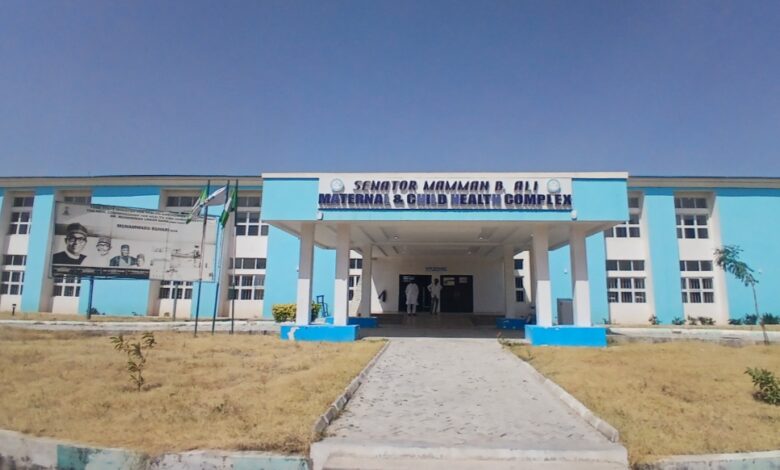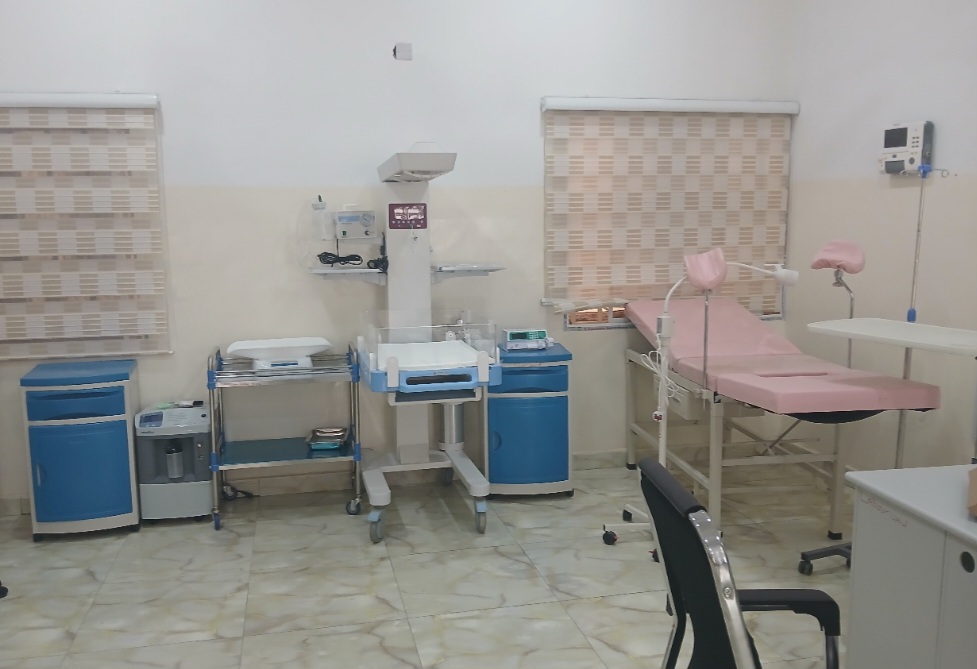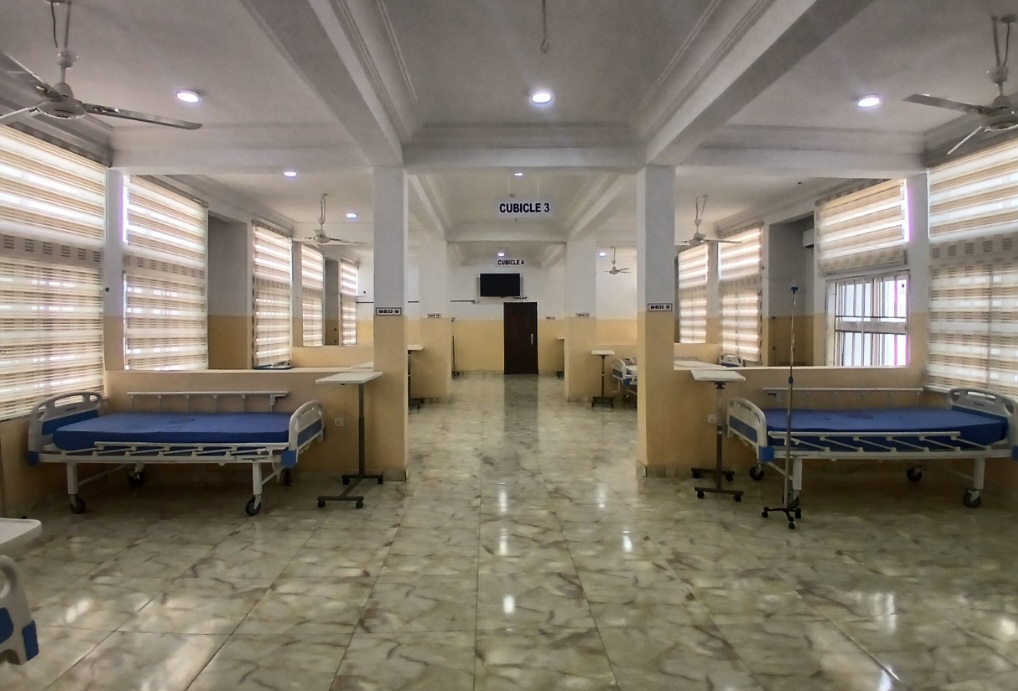Yobe’s Multi-Billion Naira Maternity Complex Sits Idle as Mothers Struggle for Care
Mothers in Yobe, northeastern Nigeria, continue to struggle with limited access to quality services and modern medical equipment, as the multi-billion naira Maternal and Neonatal Child Health Complex at the State University Teaching Hospital in Damaturu remains non-functional.

Months after his inauguration in 2019, Yobe State Governor, Mai Mala Buni, initiated the construction of a Maternal and Neonatal Child Health (MNCH) complex at the Yobe State University Teaching Hospital (YSUTH) in Damaturu. The ceremony took place in January 2020, following the State Executive Council’s approval of ₦1.5 billion for the project in December 2019.
The government claimed that funds secured through the Saving One-Million Lives Programme for Result would be used to finance the construction of the MNCH complex, which was envisioned to improve the state’s maternal and child health outcomes.
In July 2022, the council approved an additional ₦4.5 billion for the project. These funds, part of Governor Buni’s administration’s efforts to rebuild infrastructure and re-equip health facilities, were earmarked for the procurement of medical equipment and furnishings ahead of the complex’s commissioning in January 2023 by former President Muhammadu Buhari.
Between November 2022 and January 2023, when the facility was commissioned, over 1,500 maternal deaths per 100,000 live births were recorded in the northeastern state, according to Nigeria’s UK-funded Maternal, Newborn, and Child Health Programme. With the new maternal and child health complex, many believe that the alarming figure of maternal deaths will reduce in the state.
“We began to use the complex in 2024,” said Dauda Husseini, one of the first medical doctors from the obstetrics and gynaecology department of YSUTH assigned to the new facility.

Social Voices submitted a formal request to the office of the chief medical director of YSUTH to inspect the facility. Following an approval in January, the hospital’s chief security officer, acting on the management’s instructions, gathered a bunch of keys and led us through each unit of the complex.
Inside, there is a well-equipped labour ward, nurses’ stations, open cubicles, and operating theatres within the obstetrics and gynaecology unit. The paediatric medical ward features several cubicles, examination rooms, laboratories, and additional cubicles in the emergency paediatric unit. The Special Care Baby Unit is outfitted with ten newborn cots for both in and out-born babies. Other facilities include a ten-bed breastfeeding room for nursing mothers, staff duty rooms, changing areas, health information management personnel offices, a seminar room, and storage space.

Despite the widely publicised launch, these facilities are not yet operational. Apart from staff offices and consultation rooms, which are currently used for outpatient appointments, the other units remain locked and unused. Social Voices learned that patients are still admitted to the old maternity ward in the main hospital building.
‘We were expecting something different’
Fatima Umar Mele, a 30-year-old mother, cradled her seven-month-old daughter as she emerged from an office where she had just consulted with a doctor about her child’s health.
Mele expressed her concern over the continued underutilisation of the new complex. She has been visiting the hospital for antenatal care since two years ago, when the complex was still under construction. “I have been coming here for antenatal care, and we were being attended to at the old maternity ward of the hospital,” she said.
While the infrastructure of the old maternity ward is in good shape, its small size prevents it from accommodating enough beds. Moreover, it lacks the modern equipment necessary to meet the growing demand from expectant mothers.

Leaving the multi-billion naira complex—promised not only to serve Yobe but the wider North-East—non-operational means countless women will be deprived of the specialised care they need. Many personnel declined to comment when asked about the reasons for the complex’s underutilisation. Several efforts to reach Baba Waru Goni, YSUTH’s Chief Medical Director, including a visit to his office, proved abortive.
However, Dr Husseini, a senior official at YSUTH, pointed out that a severe staff shortage is at the heart of the issue. “Understaffing is our main problem. I understand that it’s a global problem, but the facility is big. If there is adequate staffing, it will live up to serving the people,” he said. Dr Husseini added that even if the new complex were fully operational, the Teaching Hospital simply doesn’t have enough personnel to meet the anticipated demand for care.
Last December, the Yobe State government approved the recruitment of 205 nurses and midwives, along with 219 health technicians, who were to be deployed across various health facilities in the state. However, Husseini remains uncertain whether his department would receive additional staff to help manage the complex’s increasing demands.
He noted that although the newly supplied equipment had yet to be put to use, the complex operated on a structured schedule, offering maternal care consultations and surgical procedures from Monday to Friday. Several women receiving antenatal and postnatal care at the Teaching Hospital, though reluctant to speak openly, said the services at the new complex were essentially no different from those in the old maternity ward. They reported receiving no special care and were unaware of the modern equipment available.

Fatima Ibrahim, who lives 100 kilometres away in Potiskum, was one of those excited when construction of the MNCH Complex began in 2020. She hoped the new facility would address the persistent shortcomings of primary healthcare services in her area.
“From pregnancy to childbirth, women here in Potiskum struggle a lot. Antenatal and postnatal care are ineffective, and there is no modern equipment. Some of us have had to travel to the Teaching Hospital in Damaturu for treatment, only to endure long queues,” said Ibrahim, a 22-year-old mother of two. “When we heard about the new complex, which they said would focus solely on women and children, we were happy.”
Ibrahim’s experience echoes the struggle women and children in Potiskum, and other rural communities face due to the lack of adequate and specialised services at local primary healthcare centres.
More money for maternal care?
Amid these challenges, Governor Buni’s administration has continued to increase healthcare spending, as reflected in the state’s budgetary allocations. Our analysis shows a significant rise in expenditure on hospital and health centre construction—from ₦63 million spent between January and September 2023 to ₦720 million in the 2024 budget. Funding for reproductive, maternal, and neonatal health has also increased, from ₦835 million in 2023 to ₦1.4 billion in 2024. Additionally, the budget earmarks ₦14 billion for functional health facilities and ₦750 million for an administration block and fire-fighting equipment at the MNCH Complex of the Teaching Hospital.

Similarly, Yobe State’s 2025 budget allocates 15.1% of its ₦320 billion approved estimates to the health sector, prioritising the construction of a new Maternity and Child Health Complex at the Specialist Hospital in Damaturu, a Paediatric Ward at the Specialist Hospital in Potiskum, and a Special Baby Care Unit at the Specialist Hospital in Buni-Yadi.
The facility is yet to work, but insurance is helping a few
While Mele waits for the MNCH Complex to become fully functional, she says enrolling in the Yobe State Contributory Healthcare Management Agency (YSCHMA) programme in 2023 has been a relief. Through the scheme, she pays only 10% of the cost of her medications whenever she visits the hospital and needs to make a purchase.
YSCHMA was launched in June 2020 to accelerate Universal Health Coverage in Yobe State by ensuring residents can access quality healthcare while reducing their health expenditures. Funding comes from contributions, donations, grants, or taxes, forming a shared pool to finance healthcare services. In 2022, YSCHMA expanded its reach to include vulnerable populations like pregnant women, children under five, the elderly, people with disabilities, and the impoverished. Babagana Tijjani, YSCHMA’s executive secretary, previously said initiatives like the programme and the facility at YSUTH are part of efforts to lower maternal mortality by 31 per cent.
But for women like Mele and Ibrahim, the insurance programme is no substitute for a functional maternal complex. “We just hope the equipment gets used for what it was bought for,” Mele said.
This report is a collaboration between Social Voices and HumAngle under the 2024 HumAngle North East Accountability Project and was first published by HumAngle.
In 2019, Yobe State Governor Mai Mala Buni initiated the construction of a Maternal and Neonatal Child Health (MNCH) complex at Yobe State University Teaching Hospital, which was completed and commissioned in January 2023.
Despite the investment, the facility remains underutilized due to staff shortages, and most medical services continue at the old maternity ward.
The state government plans to recruit additional healthcare workers to address these issues and has increased the budget for maternal healthcare. While some residents benefit from the Yobe State Contributory Healthcare Management Agency, the lack of a fully operational MNCH complex still hinders access to essential healthcare services.
Support Our Journalism
There are millions of ordinary people affected by conflict in Africa whose stories are missing in the mainstream media. HumAngle is determined to tell those challenging and under-reported stories, hoping that the people impacted by these conflicts will find the safety and security they deserve.
To ensure that we continue to provide public service coverage, we have a small favour to ask you. We want you to be part of our journalistic endeavour by contributing a token to us.
Your donation will further promote a robust, free, and independent media.
Donate HereStay Closer To The Stories That Matter




